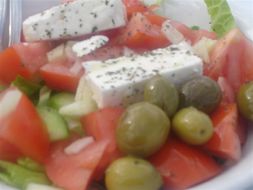|
|
|
10/3/2017 0 Comments Is Feta Cheese Healthy ? My Greek roots must have had an influence as feta cheese, being one of my favourite cheeses, I set out to find out the nutritional benefits and if any from eating it. Feta is a well known soft, white brine cheese found in Greece and Cyprus. It turns out that it is very nutritious and is an excellent source of calcium. As part of Mediterranean cuisine, this cheese is used in all sorts of dishes — from appetizers to desserts — because it can enhance the taste of foods. Most feta is made with milk from sheep and goats raised on local grass. It is this particular environment which gives the cheese its unique characteristics. Some feta can be found with a mixture of cow’s milk and goat’s/ sheep’s. Make sure to choose the goat’s/ sheep’s over the cow’s milk. Feta is considered a fresh cheese because it has not been aged or cured. It is produced in blocks and is firm to the touch, yet easy to crumble. Nutrients Found in Feta Cheese: One ounce (28 grams) provides : • Calories: 74 • Fat: 6 grams • Protein: 4 grams • Carbs: 1.1 grams • Riboflavin: 14% of the RDI • Calcium: 14% of the RDI • Sodium: 13% of the RDI • Phosphorus: 9% of the RDI • Vitamin B12: 8% of the RDI • Selenium: 6% of the RDI • Vitamin B6: 6% of the RDI • Zinc: 5% of the RDI There are relatively decent amounts of vitamins A and K, folate, pantothenic acid (Vitamin B5), iron and magnesium. Compared to aged cheeses like cheddar or Parmesan, feta is lower in fat and calories. Additionally, it contains more calcium and B vitamins than other fresh cheeses like mozzarella, ricotta, cottage cheese or goat cheese. It Can Support Bone Health: Feta cheese is a good source of calcium, phosphorus and protein, all of which have been proven to promote bone health. Calcium and protein help maintain bone density and prevent osteoporosis, while phosphorus helps your bones absorb calcium. Feta Cheese Is Good for Your Gut: Probiotics are live, friendly bacteria that can benefit your health. Feta has been shown to contain Lactobacillus plantarum, which accounts for about 48% of its bacteria. These bacteria can help promote immune system also provide anti-inflammatory benefits. CLA (Conjugated Linoleic Acid): CLA is a fatty acid found in animal products. It has been shown to help improve body composition, decreasing fat mass and increasing lean body mass. CLA may also help prevent diabetes and has shown anti-cancer effects. Greece has the highest consumption of cheese in the European Union and also the lowest incidence of breast cancer. Disadvantages of Eating Feta: Salt: Feta is high in salt. One serving contains 312 mg of sodium in a 1-ounce (28-gram) serving, which can account for up to 13% of your RDI. To reduce the salt content, you can rinse it with water before eating it. Lactose: It is made from whole milk, hence it is higher in lactose. People intolerant to lactose should avoid eating feta. Pregnant women: Listeria monocytogenes is a type of bacteria found in water and soil that can contaminate crops and animals. Pregnant women are usually advised to avoid consuming raw vegetables and meats, as well as unpasteurized dairy products, because they have the potential to be contaminated with these bacteria. Cheeses made with unpasteurized milk have a higher risk of carrying the bacteria than cheeses made with pasteurized milk. Therefore, feta cheese made with unpasteurized milk is not recommended for pregnant women. How to Eat Feta Cheese: Feta is quite a versatile cheese and can be added to a variety of dishes, such as salads, omelets, wholegrain bread, potatoes, cooked vegetables. It can also be grilled or cooked in dishes such as saganaki. At the end of the day, feta cheese seems to be a healthy, delicious choice !
0 Comments
Leave a Reply. |
AuthorBarbara is a qualified nutritionist offering Health, Nutrition & Lifestyle Counseling. She gives Healthy weight loss advice and promotes the Mediterranean diet. She is the author of the Med Life Diet - creating healthy lifestyle habits and attitudes for life ! Archives
April 2024
|
 RSS Feed
RSS Feed
